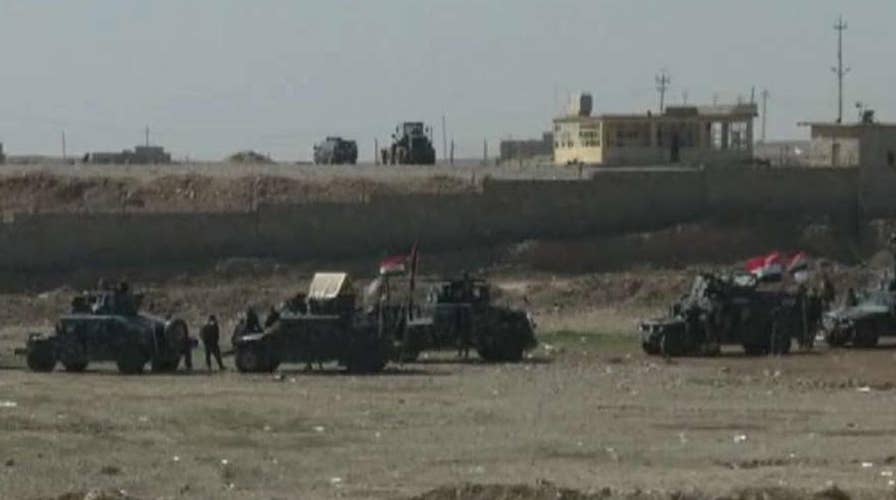Iraqi troops launch effort to retake western Mosul from ISIS
Kitty Logan provides latest updates
SOUTH OF MOSUL, Iraq – Iraqi Federal Police forces on Monday pushed into the southern outskirts of Mosul on the second day of a new push to drive Islamic State militants from the city's western half as the U.S. defense secretary started a visit to Iraq to discuss the fight against IS.
Backed by aerial support from the U.S.-led international coalition, Iraqi police and regular army troops launched an offensive on Sunday to retake western Mosul from IS following a 100-day campaign that pushed the militants from the eastern half of the city.
Iraqi helicopters were seen firing rockets at the village of Abu Saif early Monday morning, mainly at a hill that overlooks the city's airport and provides the militants with a natural defense line on the southern approaches to Mosul. By noon, the forces entered the village and gained control over much of the strategic hill as fighting was still raging, according to an Associated Press reporter embedded with the forces.
Separately, police forces in armored vehicles were moving toward the sprawling Ghazlani military base on the southwestern outskirts of the city.
Some U.S.-led coalition soldiers in their armored vehicles were also seen advancing toward Abu Saif village along with the police. On Sunday, U.S. Defense Secretary Jim Mattis, said while in the United Arab Emirates' capital, Abu Dhabi, that U.S. troops "are very close to it, if not already engaged in that fight."
Mattis declined to go into further detail, saying he owed "confidentiality" to the troops.
Under President Donald Trump's deadline, Mattis has just a week to prepare a strategy to accelerate the fight and defeat IS. And any plan is likely to depend on U.S. and coalition troops working with and through the local forces in both Iraq and Syria.
"We're going to make certain that we've got good situational awareness of what we face as we work together and fight alongside each other," Mattis said.
His key goal during the visit to Baghdad is to discuss the military operations with political leaders and commanders on the ground, including his top commander in Iraq, Lt. Gen. Stephen Townsend.
The U.S.-led coalition has been providing close air support throughout the four-month-old Mosul offensive, while U.S. special operations forces are embedded with some Iraqi units and thousands of American soldiers are in Iraq to provide logistical and other support.
There are more than 5,100 U.S. forces in Iraq, and about 500 in Syria.
Mosul, Iraq's second-largest city and the last IS urban stronghold in the country, fell into the hands of the extremists in the summer of 2014, when the group captured large swaths of northern and western Iraq.

